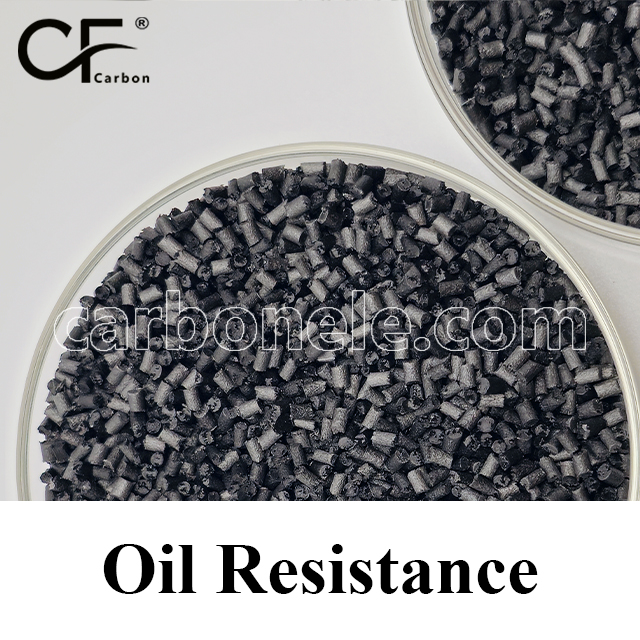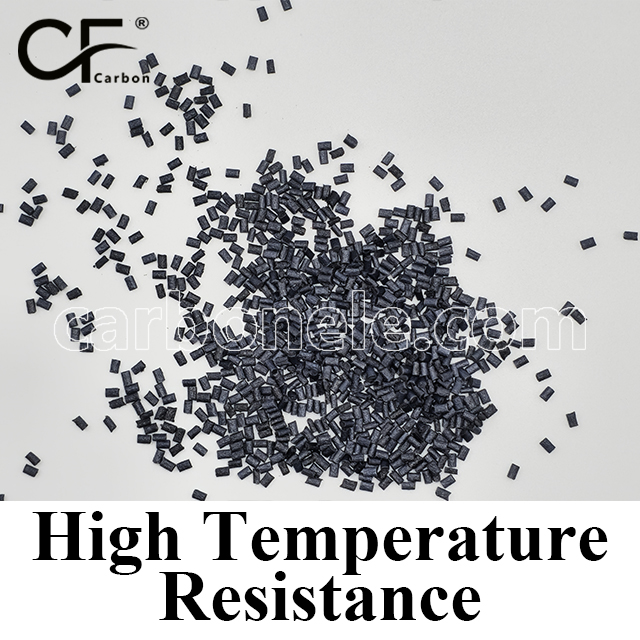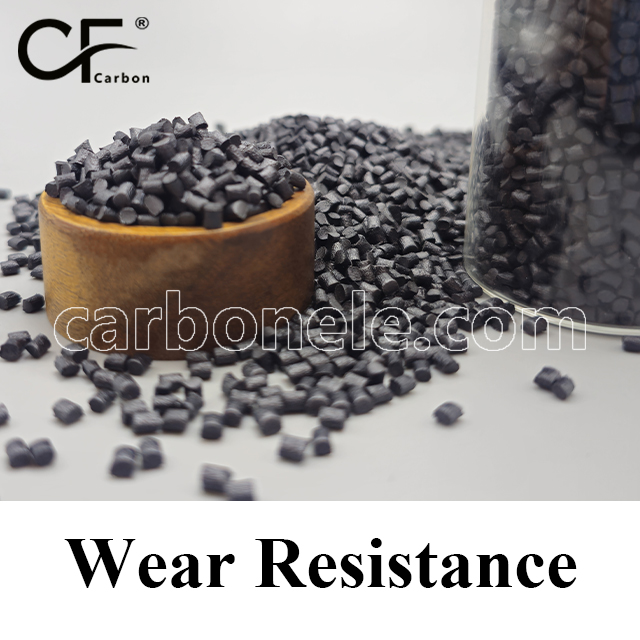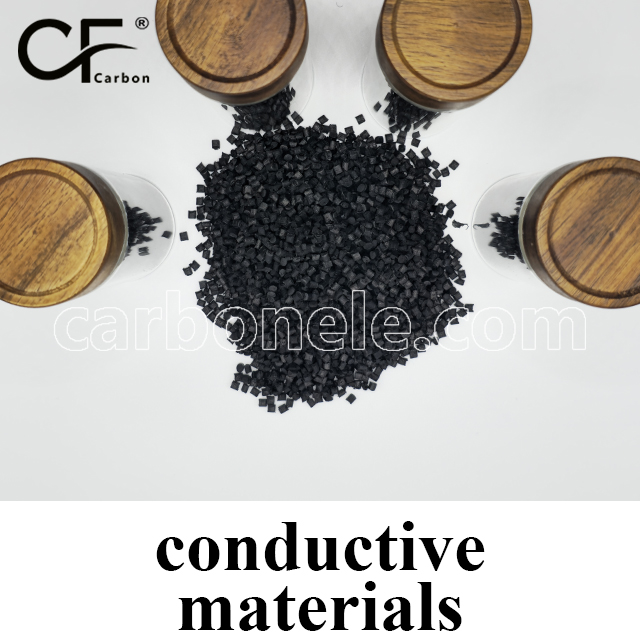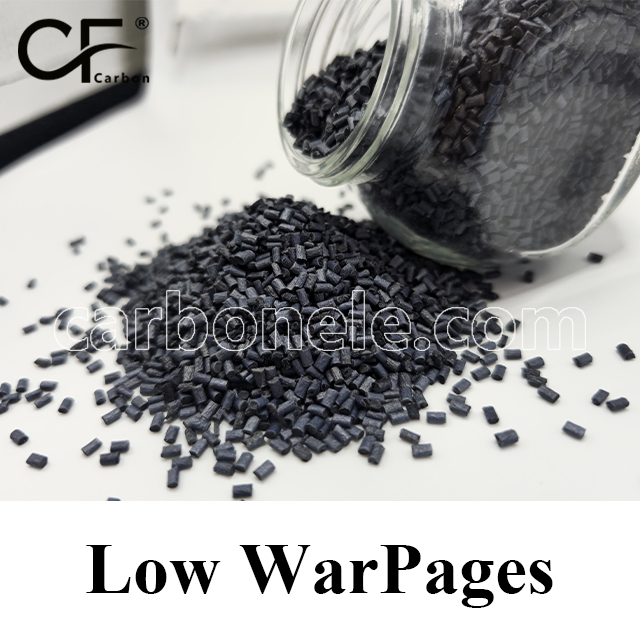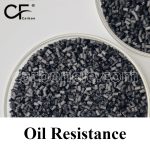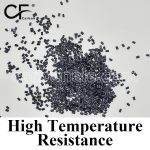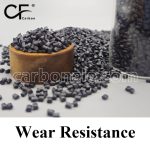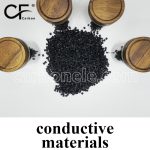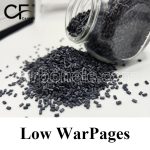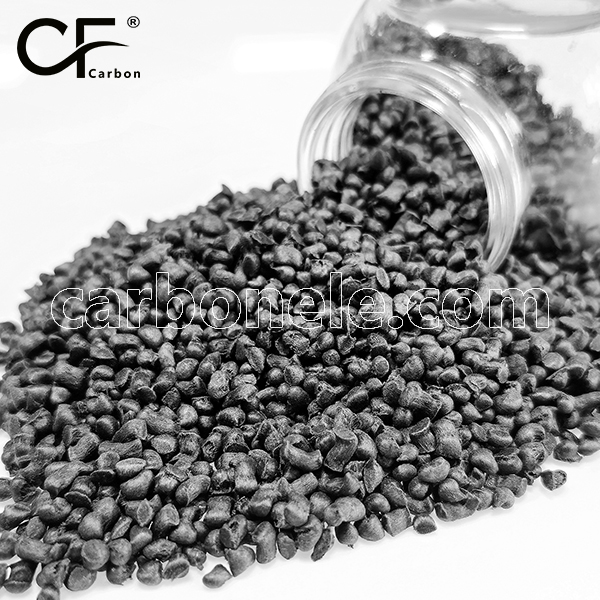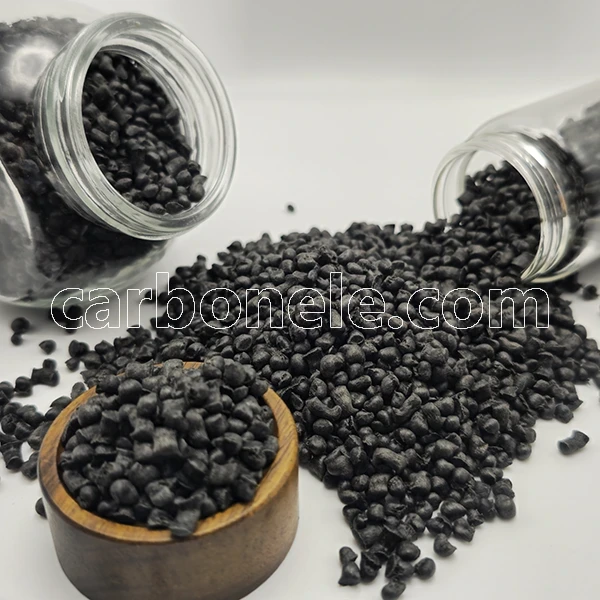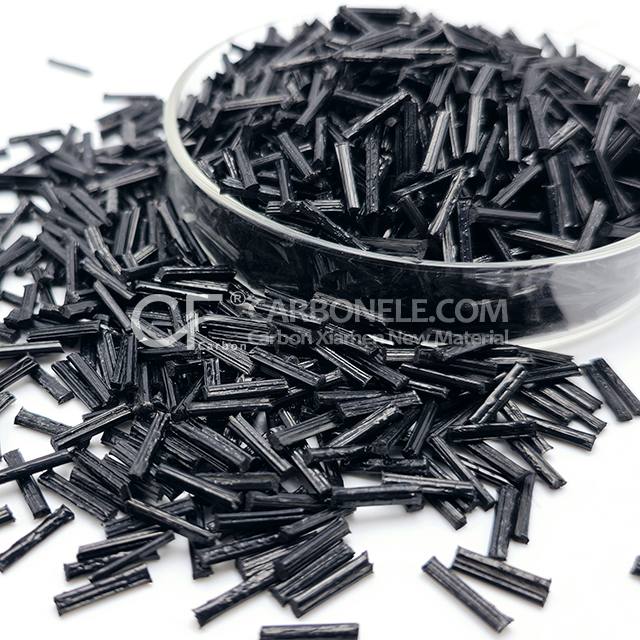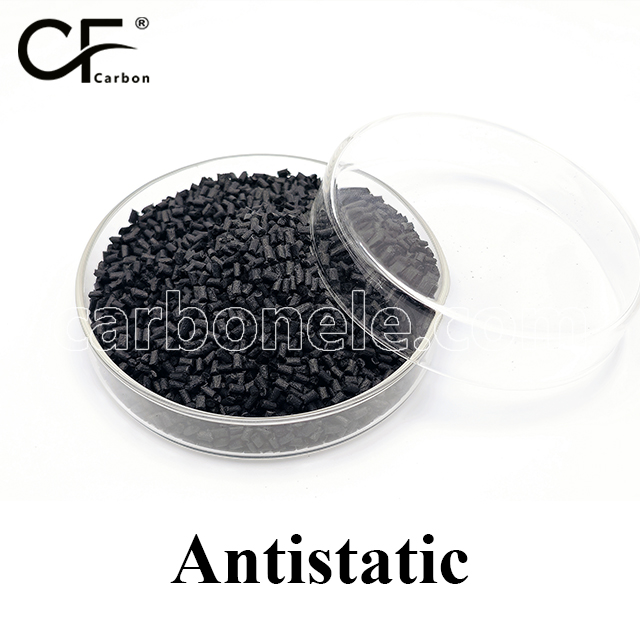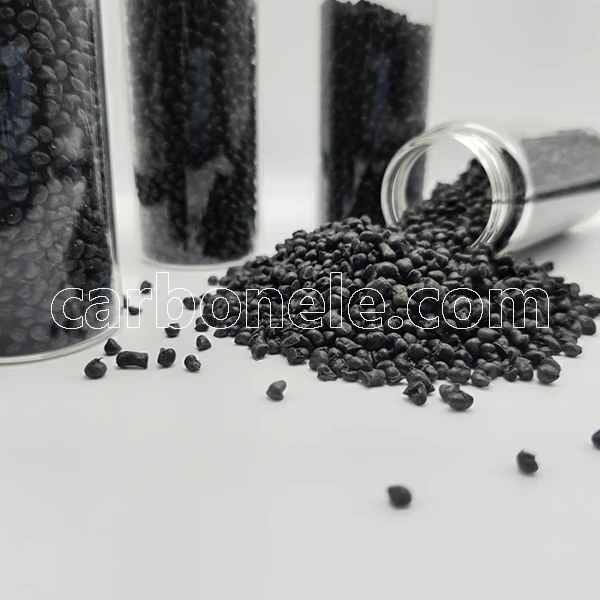TPU-CF40 is a high strength, semi rigid thermoplastic elastomer reinforced with 40% short carbon fiber, offering exceptional stiffness, dimensional stability, and wear resistance while retaining controlled flexibility. Ideal for structural components exposed to high load, heat, and chemical environments.

TPU-CF40 for harsh operating environments
- Model number: TPU-CF-BCA4
- Matrix Resin: Thermoplastic polyurethane (TPU)
- Reinforcing Filler: Carbon fiber
- Appearance: Granules
- Grade: Injection/extrusion grade
- Packaging: 25kgs/bag
TPU-CF40 | 40% Carbon Fiber Reinforced Thermoplastic Polyurethane
TPU-CF40 is a next-generation, high-strength thermoplastic composite that strategically integrates 40% short carbon fiber reinforcement into a durable thermoplastic polyurethane (TPU) matrix. This advanced engineering material combines the best of both worlds: the flexibility, abrasion resistance, and shock absorbing properties of TPU, with the dimensional stability, stiffness, and tensile strength imparted by high carbon fiber content.
The result is a semi rigid elastomer that can withstand high mechanical loads, repeated motion, and elevated temperatures—without losing its ability to flex under stress or absorb dynamic forces. TPU-CF40 represents a major leap in structural thermoplastic performance, offering a compelling alternative to metals, fiber filled nylons, and rigid polymers in mechanically demanding environments.
With enhanced thermal resistance, superior fatigue strength, and low moisture uptake, TPU-CF40 maintains dimensional stability and mechanical integrity even in humid, chemically aggressive, or high-vibration applications. This makes it particularly suitable for sectors where precision, strength, and resilience must coexist, such as automotive systems, robotic mechanisms, industrial machinery, and protective equipment.
Core Performance Highlights
Mechanical Properties
Carbon Fiber Content: 40% (short carbon fiber, uniformly dispersed)
Tensile Strength: ≥ 80 MPa
Elongation at Break: ≥ 50%
Shore Hardness: ~97A
→ Offers high stiffness and load bearing capacity, yet maintains essential elasticity to absorb shocks and impacts in dynamic assemblies.
Thermal Resistance
Heat Deflection Temperature (HDT): ~115 °C
Continuous Use Temperature: Up to 100 °C
→ Suitable for under hood environments, near heat generating actuators, or enclosures exposed to friction and thermal cycling.
Environmental & Chemical Durability
Moisture Absorption: Very low — dimensional stability under wet or humid conditions
Chemical Resistance: Excellent — resistant to oils, greases, fuels, solvents
→ Enables reliable long term use in chemically harsh and corrosive surroundings, including automotive fluids and industrial chemicals.
Processing & Manufacturing
Molding Methods: Injection molding, extrusion, 3D filament extrusion
Surface Finish: Matte with textured fiber appearance; surface aesthetics vary by tool, orientation, and process
Tooling Requirements: High abrasion resistant tooling and optimized flow designs are recommended to protect fiber length and ensure mold cavity integrity.
→ TPU-CF40 supports efficient processing with modern manufacturing techniques while retaining its advanced material properties across production runs.
Target Applications
Automotive & Transportation
Flexible yet reinforced mounts, semi rigid brackets, thermal shields
→ Balances form retention with deflection — ideal for dynamic zones adjacent to engines or transmissions where vibration, heat, and oil exposure coexist.
Industrial Machinery & Equipment
High cycle vibration isolators, pressure durable couplings, flex rigid structural interfaces
→ Performs reliably in environments with rotational load, mechanical shock, and thermal fatigue, reducing downtime and component failure rates.
Robotics & Mechatronics
Support skeletons, structural actuator frames, dynamic armature joints
→ Provides controlled flexibility with reinforced stiffness — enabling hybrid structures that require both load transfer and articulation.
High Performance Gear & Consumer Protection
Impact guards, exo structural shells, energy absorbing backplates
→ Delivers next level ruggedness and longevity to products used in demanding sports, outdoor, tactical, and industrial safety equipment.
Performance Summary Table
| Property | Value / Description |
|---|---|
| Carbon Fiber Content | 40% (Short Carbon Fiber) |
| Tensile Strength | ≥ 80 MPa |
| Elongation at Break | ≥ 50% |
| Shore Hardness | ~97A |
| Heat Deflection Temp. | ~115 °C |
| Long Term Service Temp. | Up to 100 °C |
| Water Absorption | Very low — retains form and function in moist conditions |
| Chemical Resistance | Excellent — resists oils, greases, fuels, industrial solvents |
| Wear Resistance | Extremely high — ideal for sliding, abrasive, or repetitive motion parts |
| Processing Methods | Injection molding, extrusion, 3D printing |
| Surface Finish | Matte/textured — carbon visibility enhances at higher loadings |
| Dimensional Stability | Superior — ideal for hybrid structural elastomeric applications |
If you want to get more information about TPU-CF40, you can vist our Youtube.
Friction coefficient of PA12-LCF
The friction coefficient of TPU is typically between 0.3 and 0.5, while TPU-CF, with added carbon fiber, lowers the friction coefficient to between 0.2 and 0.4. The smaller the value, the better the wear resistance. Therefore, TPU-CF generally offers better wear resistance than pure TPU, especially under high-load conditions.
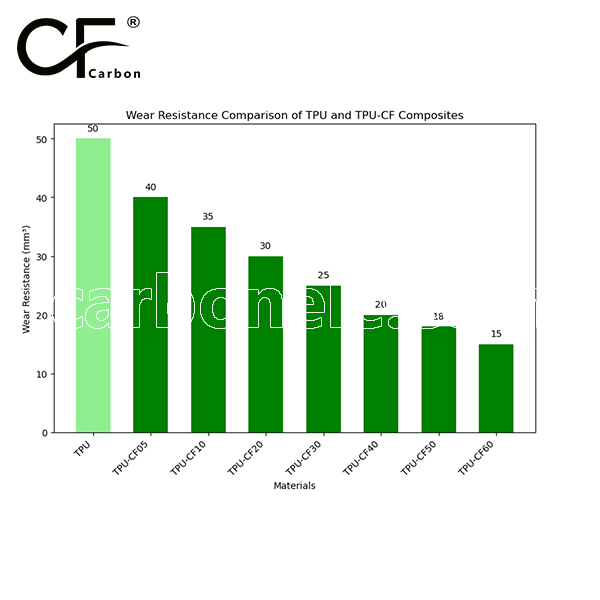
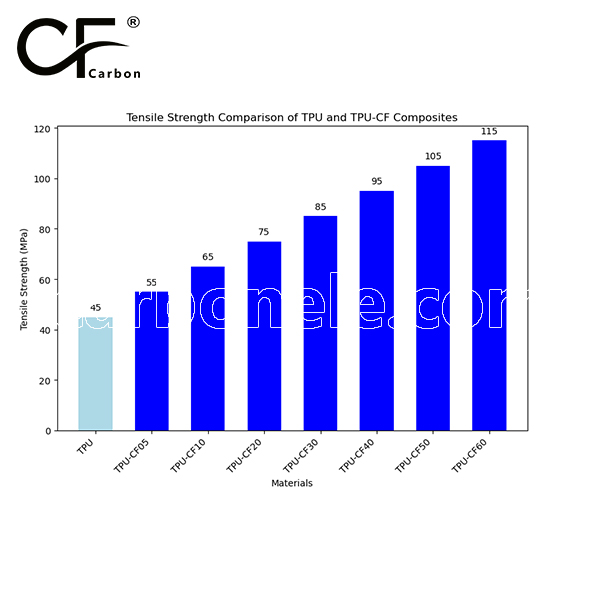

Frequently Asked Questions
Carbon (Xiamen) New Material Co., Ltd. aims to provide buyers with "one-stop" worry-free high-quality services. Here you can find all information about carbon fiber engineering plastics. If you still have questions, please send us an email for consultation!
-
How can I contact the manufacturer of a product that interests me?
When you find a product you are interested in, you can contact the manufacturer directly by sending an email and we will get back to you as soon as possible.
-
How do I find the products that interest me?
All you need to do is enter the keyword, product name in the search window and press the Enter key on your keyboard. Your search results page will then be displayed. You can also search within the product category pages on the home page. Each category is divided into subcategories, allowing you to refine your search and find products that interest you.
-
Where will I find a buying guide?
Please contact our after-sales service directly and we will provide you with a comprehensive operating guide.
-
What are CF Reinforced Thermoplastic Composites?
CF Reinforced Thermoplastic Composites are materials where carbon fibers are incorporated into a thermoplastic matrix. They combine the strength and stiffness of carbon fibers with the processability and recyclability of thermoplastics. For instance, they are used in automotive parts like bumper beams.
-
What are the benefits of CF Reinforced Thermoplastic Composites over traditional composites?
The key benefits include faster production cycles, easier recyclability, and better impact resistance. They also offer design flexibility. An example is in the manufacturing of consumer electronics casings where complex shapes can be achieved more easily.
-
How are CF Reinforced Thermoplastic Composites processed?
Common processing methods include injection molding, extrusion, and compression molding. Injection molding is widely used for mass production. For example, in the production of small components for the medical industry.
-
What industries use CF Reinforced Thermoplastic Composites?
They are utilized in aerospace, automotive, medical, and sports equipment industries. In aerospace, they can be found in interior components. In the medical field, they might be used in prosthetics.
-
How does the carbon fiber content affect the properties of the composites?
Higher carbon fiber content generally leads to increased strength and stiffness but may reduce ductility. A moderate content is often balanced for specific applications. For example, a higher content might be preferred in structural parts of a race car.
-
What are the challenges in using CF Reinforced Thermoplastic Composites?
Challenges include higher material costs, complex processing equipment requirements, and ensuring uniform fiber dispersion. Issues with adhesion between the fibers and the matrix can also arise. An example is in achieving consistent quality in large-scale production.







